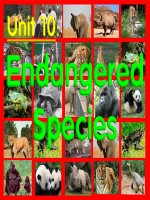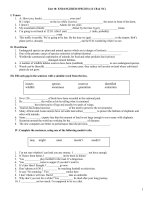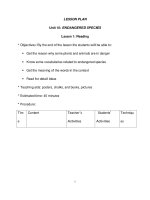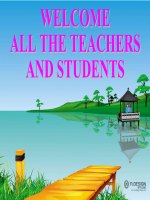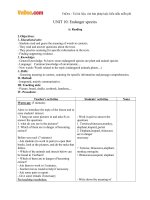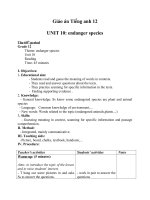- Trang chủ >>
- Đề thi >>
- Đề thi lớp 11
BTAV 12 UNIT 10 ENDANGERED SPECIES test 2 keys
Bạn đang xem bản rút gọn của tài liệu. Xem và tải ngay bản đầy đủ của tài liệu tại đây (297.3 KB, 4 trang )
UNIT 10 ~ ENDANGERED SPECIES
PRACTICE TEST 2
A. PHONETICS
I. Pick out the word whose underlined part is pronounced differently from that of the others.
1. A. threatened
B. provided
C. identified
D. disappeared
2. A. globe
B. commerce
C. biologist
D. loss
3. A. destruction
B. product
C. vulnerable
D. humans
4. A. benefit
B. extinct
C. temperature
D. wetland
5. A. commercial
B. chemical
C. agriculture
D. conserve
II. Pick out the word that has the stress pattern different from that of the others.
6. A. animal
B. medicine
C. development
D. government
7. A. exploitation
B. disappearance
C. conservation
D. temperature
8. A. several
B. protection
C. different
D. habitat
9. A. commercial
B. valuable
C. mankind
D. agency
10. A. available
B. extinction
C. survival
D. introduce
B. VOCABULARY AND STRUCTURE
I. Choose the most suitable word or phrase (A, B, C or D) to complete each sentence.
11. Put some oil on that tight nut; that........do the trick.
A. might
B. must
C. had to
D. could
12. The most serious problem of modern times is that man is destroying the natural.........of the earth and
transforming huge areas into wasteland.
A. resources
B. sources
C. sorts
D. origins
13. Only by reproducing at a tremendous rate do many plant and animal species manage.........in the sea.
A. surviving
B. to survive
C. living
D. to be alive
14. The life of a spy is fraught with.........
A. endanger
B. danger
C. dangerous
D. dangerously
15. I hear Emma's been offered a place at university. She.........be really pleased.
A. can
B. might
C. may
D. must
16. Before Alexandre Fleming discovered penicillin, many people died.........
A. infected with simple bacteria
B. from simple bacterial infections
C. infections were simple bacteria
D. infecting of simple bacteria
17. As the drug took.........the patient became quieter.
A. force
B. influence
C. action
D. effect
18. Don't leave paraffin heaters in a draught or where they're..........
A. dangerously knocked over
B. in danger knocked over
C. in danger of being knocked over
D. in danger of knocking over
19. The tenant.........be prepared to decorate the property in accordance with the terms of the agreement.
A. may
B. ought
C. must
D. have to
20. He had to leave early, .........he?
A. didn't
B. mustn't
C. hasn't
D. shouldn't
21. Hair colour is one of the most obvious characteristics to be used to.........people.
A. recognise
B. identify
C. realise
D. define
22. Many people like the slow........of life in the countryside.
A. step
B. pace
C. speed
D. space
23. Wild animals are........almost everywhere.
A. serious threatened
B. seriously threaten
C. seriously threatened
D. serious threaten
24. I don't think you are.........of how much this means to me.
A. aware
B. realised
C. known
D. understood
25. I can't find my purse anywhere; I must.........it at the cinema.
A. leave
B. have been leaving
C. be leaving
D. have left
II. Choose the underlined part among A, B, C or D that needs correcting.
26. (A) Some conservationists (B) attempt to save (C) rarity domestic farm animals, (D) such as the Tamworth
pig.
27. Because of habitat (A) lose, (B) there are (C) fewer Asian elephants than African (D) elephants.
28. (A) The most desert animals (b) avoid the extreme midday (c) heat by (d) feeding at night.
29. I (A) don't have to forget my key, (B) or I (C) won't (D) get in.
30. (A) As we had (B) plenty of (C) food we (D) mustn't go to. the supermarket.
III. Choose the one option (A, B, C or D) corresponding to the best sentence that is made up from the
sets of words and phrases given.
31. Ed/ not need/register /new course
A. Ed did not need to register for the new course.
B. Ed did not need register for the new course.
C. Ed need not to register for the new course.
D. Ed need not register the new course.
32. You / do exact / manager / tell
A. You have to do exactly the manager tells you.
B. You must tell the manager to do exactly.
C. You must do exactly what the manager tells you.
D. You must do exact what the manager tells you.
33. It / rain / later / take / umbrella
A. It's going to rain; why not take an umbrella later?
B. It might rain later so take an umbrella.
C. It will rain sooner or later to take an umbrella.
D. It could rain, so take an umbrella later.
34. Louis / have difficulty /get / new table / car
A. Louis had difficulty getting the new table in the car.
B. Louis had difficulty to get the new table in the car.
C. Louis had difficulty with getting the new table in the car.
D. Louis had difficulty for getting the new table in the car.
35. When /I / be / school /I / not / wear / uniform
A. When I was at school, I had not to wear a uniform.
B. When I was at school, I mustn't wear a uniform.
C. When I was at school, I didn't have to wear an uniform.
D. When I was at school, I didn't have to wear a uniform.
C. READING
I. Read the passage below and decide which answer (A, B, C or D) best fits each space.
THE THREAT TO THE ENVIRONMENT
Nowadays people are more aware that wildlife all over the world is in danger. Many (36).........of animals are
threatened, and could easily become (37)........if we do not make an effort to protect them. There are many
(38)........for this. In some cases, animals are hunted for their fur or for othervaluable parts of their bodies.
Some birds, such as parrots, are caught (39).........and sold as pets. For many animals and birds, the problem is
that their habitat - the (40).........where they live - is disappearing. More (41).........is used for farms, for houses
or industry, and there are fewer open (42).........than there once were. Farmers use powerful chemicals to help
them grow better (43)........, but these chemicals pollute the environment and (44)..........wildlife. The most
successful animals on earth - human beings - will soon be the only Ones left, unless we can (45).........this
problem.
36. A. marks
B. more
C. species
D. forms
37. A. disappeared
B. vanished
C. empty
D. extinct
38. A. reasons
B. causes
C. results
D. effects
39. A. lively
B. alive
C. for life
D. for living
40. A. spot
B. point
C. place
D. site
41. A. earth
B. land
C. soil
D. area
42. A. spaces
B. air
C. up
D. parts
43. A. products
B. fields
C. herbs
D. crops
44. A. spoil
B. harm
C. wound
D. wrong
45. A. answer
B. calculate
C. solve
D. explain
II. Read the passage below and choose the best answer (.A, B, C or D) question.
Scientists believe they now have scientific evidence to pifove that ecosystems work better when there is a
greater variety of specifes within them. This biodiversity is being lost destroying natural mechanisms that
could repair the damage caused by man.
Findings show that losing plants and animals is not only reducing our quality of life but actually endangering
our very existence. We cut down rich rain-forests and replace them with one species plantations, such as pine
and eucalyptus. We plough up meadows rich in different grasses and herbs and replace them with one grass,
for instance rye or wheat.
When a natural ecosystem is simplified the basic processes in the ecosystem are altered arid even damaged.
Without their biodiversity they are not able to serve as the natural cleaners of our planet. No longer are they
able to absorb the carbon dioxide that is being produced in excess. The result is global warming, caused by the
increase in the "greenhouse effect", and ultimately, or even sooner, there will be a change in the world's
climate.
46. Which of the following is the best title for the passage?
A. How Ecosystems Work Better
B. The Loss of Biodiversity
C. The Variety of Species
D. Natural Mechanisms
47. Which of the following is NOT a species used to replace a rich ecosystem?
A. Herbs
B. Pine
C. Eucalyptus D. Rye
48. What is the purpose of paragraph 2?
A. To show natural mechanisms at work.
B. To give examples of the loss of biodiversity.
C. To give examples of variety of species.
D. To show how ecosystems can work better.
49. What, according to the passage, might be the final result of the simplification of natural ecosystems?
A. The basic processes are altered.
B. There is loss of biodiversity.
C. There, is global warming.
D. There is a change in the climate.
50. What is the author's attitude to the loss of biodiversity?
A. Indifferent
B. Negative
C. Positive
D. Neutral
The End
Alexandre Fleming
Sir Alexander Fleming (6 August 1881 – 11 March 1955) was a
Scottish physician, microbiologist, pharmacologist and botanist. His
best-known discoveries are the enzyme lysozyme in 1923 and the
world's first antibiotic substance benzylpenicillin (Penicillin G) from
the mould Penicillium notatum in 1928, for which he shared the Nobel
Prize in Physiology or Medicine in 1945 with Howard Florey and
Ernst Boris Chain.
Tamworth Pigs
The Tamworth is a breed of domestic pig originating in Tamworth, United Kingdom, with input
from Irish pigs. It is among the oldest of pig breeds, but as with many older breeds of livestock,
it is not well suited to modern production methods and is listed as "Threatened" in the United
States and "Vulnerable" in the UK by the Rare Breeds Survival Trust, as fewer than 300
registered breeding females remain.
ANSWER KEY
1. B
2. A
3. D
4. B
5. A
6. C
7. D
8. B
9. A
10. D
11. A
12. A
13. B
14. B
15. D
16. B
17. D
18. C
19. C
20. A
21. B
22. B
23. C
24. A
25. D
26. C rare
27. A loss
28. A Most
29. A mustn’t
30. D didn’t
need to
Click Here!
31. A
32. C
33. B
34. A
35. D
36. C
37. D
38. A
39. B
40. C
41. B
42. A
43. D
44. B
45. C
46. B
47. A
48. B
49. D
50. C
